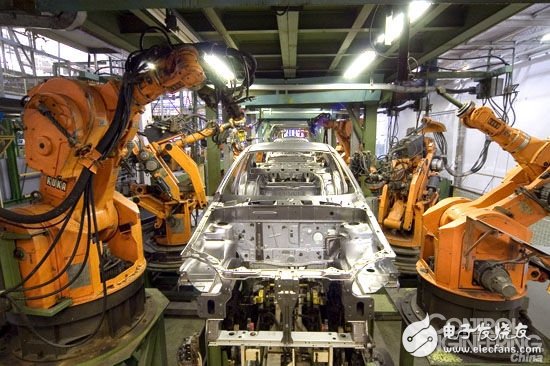At the press conference of the 2018 World Robotics Congress held in Beijing recently, Luo Junjie, deputy director of the Equipment Department of the Ministry of Industry and Information Technology, said that robots are not only representatives of advanced manufacturing, but also the key development areas identified by "Made in China 2025". The Ministry of Industry and Information Technology will promote the improvement of industrial quality to the middle and high end; prevent disorderly competition in the industry and standardize the development of the industry; focus on cultivating world-class robot industry clusters, promote the development of large and medium-sized enterprises; strengthen the interface with the international community, and open up a new pattern of opening up to the outside world In four aspects, it promotes the high-end development and scale application of robots and key components.
Industrial robots represent not only an industrial direction, but also an important symbol of the country's ability and level in the high-tech field. If there is a big breakthrough in the field of industrial robots, China will upgrade to the level of science and technology, improve the level of industry, and especially improve the level of economic development will reach a new level.

Today, China has become the fastest growing industrial robot density in the world. In the latest statistics of the International Federation of Robotics (IFR), China's industrial robot density ranks 23rd in the world, and the government continues to support it through policy. It is expected to become China's top ten countries in terms of global automation by 2020. . From the current point of view, although the industrial robot industry is very lively, industrial robots are also focusing on the development of industrial robots as key industries and key industries. In many places, industrial robots have also become an important starting point for local industrial transformation and economic transformation, and some places have emerged. The phenomenon that industrial robot companies are blooming everywhere. However, strictly speaking, there are very few that can really be called industrial robots. Under more circumstance, industrial robots are just like the earliest drones and chips. They can only be used for visiting and watching. They are really used for production and life, but they are of little value to improve the efficiency of economic operation. To a certain extent, some local industrial robots are following the footsteps of the photovoltaic industry in the past few years. A large number of enterprises and investors are viciously competing in the field of low-end industrial robots. According to the data of the Ministry of Industry and Information Technology, there are more than 800 enterprises involved in robot production in China, of which more than 200 are robotic body manufacturing enterprises. Most of them are based on assembly and processing. They rely on “cost-effectiveness†rather than core technology to open the market and are in the industrial chain. The lower end, and the industry concentration is low, the overall scale is small.
The consequences of vicious competition not only waste a lot of manpower, material resources and financial resources, but also affect the enthusiasm of enterprises engaged in research and development in the field of industrial robots, hinder the orderly development and quality improvement of industrial robots, and stun the industrial robots. The pace of advancement in the high-end sector. Because many policies surrounding industrial robots will be dispelled by low-end manufacturing and vicious competition, so that enterprises and investors who research and develop robots in the middle and high-end areas cannot enjoy policy support and support. "2017-2022 China's robot industry development trend and investment decision analysis report" shows that although China's robotics industry's revenue and net profit growth momentum is obvious, but in recent years, both gross profit margin and net interest rate have been lower. Gross profit margin fell from 40.89% to 34.53% between 2010 and 2016, while the gross profit margin for the first three quarters of 2017 was 31.65%. The downward trend in net interest rates is more pronounced, with a net profit margin of only 12.34% in the first three quarters of 2017.
Based on the weak foundation of China's robot industry, especially the weak independent innovation capability of enterprises and the lack of core technology, the key now lies in the research and development of industrial robots. Foreign industrial robot research has moved to the middle and high end, which is much higher than the industrial robots that most of our industrial robot companies have introduced. If we do not raise the starting point of R&D and stand on the high-tech level to research and develop industrial robots, then China will not be able to achieve breakthroughs in the high-end market of industrial robots. China's industrial robots must step out of a new road to victory in the high-tech field. This also means that China's industrial robot research and development, from now on should set high standards, self-reliance and high standards, in the policy, resources, funds and other aspects, around the industrial robot to the middle and high-end advancement. Only by pushing yourself to the corner, can we research and develop industrial robot products that are truly internationally competitive, in order to avoid repeating the mistakes of the photovoltaic industry that year.
In short, China's industrial robots can't be sneak peek, but high-end leadership; not just products, but technology; not just how much output, but how high the quality. It is better to slow down the pace of development, but also to have a high level of technology. It is better to have less production and more technical standards.
It is eagerly expected that the relevant government functional departments can change their thinking and change their concepts in the formulation of industrial robot industry policies, the layout of industrial planning, and the introduction of support policies.
Oem Scan Engine,Zebra Oem Scan Engine,Small Barcode Engine, Barcode Engine
Guangzhou Winson Information Technology Co., Ltd. , https://www.barcodescanner-2d.com